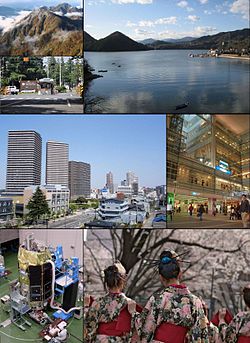Sagamihara, Kanagawa
|
Sagamihara 相模原市 |
|||
|---|---|---|---|
| Designated city | |||
| Sagamihara City | |||

From top left: Tanzawa mountains, USARJ Sagami General Depot, Lake Sagami, Hashimoto District, Odakyu Sagami-Ōno Station, JAXA Sagamihara Campus, Sakura Festival
|
|||
|
|||
 Location of Sagamihara in Kanagawa Prefecture |
|||
| Coordinates: 35°34′N 139°22′E / 35.567°N 139.367°ECoordinates: 35°34′N 139°22′E / 35.567°N 139.367°E | |||
| Country | Japan | ||
| Region | Kantō | ||
| Prefecture | Kanagawa Prefecture | ||
| Government | |||
| • Mayor | Toshio Kayama | ||
| Area | |||
| • Total | 328.66 km2 (126.90 sq mi) | ||
| Population (October 1, 2016) | |||
| • Total | 721,686 | ||
| • Density | 2,194.84/km2 (5,684.6/sq mi) | ||
| Time zone | Japan Standard Time (UTC+9) | ||
| - Tree | Zelkova serrata | ||
| - Flower | Hydrangea | ||
| - Bird | Skylark | ||
| Phone number | 042-754-1111 | ||
| Address | 2-11-15 Chūō, Chūō-ku, Sagamihara-shi, Kanagawa-ken 252-5277 | ||
| Website | www |
||
Sagamihara (相模原市 Sagamihara-shi?) is a city in north-central Kanagawa Prefecture, bordering Tokyo, Japan. It is the third most populous city in the prefecture, after Yokohama and Kawasaki, and the fifth most populous suburb of Greater Tokyo. Its northern neighbor is Machida, with which a cross-prefectural merger has been proposed.
As of October 2016, the city has an estimated population of 721,686 and a population density of 2,194.84 persons per km². The total area was 328.66 km².
On 1 April 2010, the city became the 19th city designated by government ordinance. As a result of this, three wards were established: Midori-ku, Chūō-ku and Minami-ku.
The area of modern Sagamihara has been settled since ancient times, and has a number of remains from the Japanese Paleolithic period and Kofun period have been found. It was home to the Yokoyama clan, one of the seven warrior clans of the Musashi region during the early Kamakura period. During the Edo period, the lands around Sagamihara were tenryō territory theoretically administered directly by the Tokugawa Shogunate in Edo; however, in reality, the area was a patchwork of small fiefs held by various hatamoto, as well as exclaves under the control of the Ogino-Yamanaka Domain and Karasuyama Domain.
...
Wikipedia



